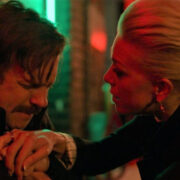JOE VS THE VOLCANO: Achieving A Heightened State Of Being
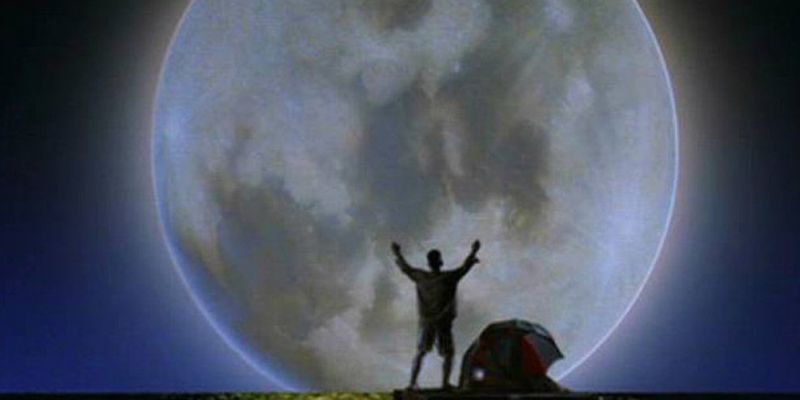
All articles contributed by people outside of our team are…
Joe Versus the Volcano came out in 1990. It stars Tom Hanks and Meg Ryan. It’s full of camp, love, adventure, musical montages, and over-the-top acting. It is, on the surface, extraordinarily easy to dismiss. Behind the cheese factor, however, Joe Versus the Volcano is one of the most deeply impactful films to have come out in the past thirty years, and now, as the world seems increasingly like a lost cause, and nihilism increasingly resembles realism, the message it instills is vital, a spirit-saver.
Director and writer John Patrick Stanley is better known amongst the theatre crowd, but was put on the map by his New York love story Moonstruck, starring Cher, and urging a resurgence of impassioned romantic engagement. Similar themes abound in Joe, compounded, however, by much more deeply archetypal themes, buried in ever more deceptive screwball antics.
The film’s critical reception was dismal at best, as many critics focused on an aesthetic standard fallen short of, missing entirely the heart of the thing. Vincent Canby wrote, “Not since Howard the Duck has there been a big-budget comedy with feet as flat as those of Joe Versus the Volcano. Many gifted people contributed to it, but there’s no disbelieving the grim evidence on the screen.”
Time critic Richard Schickel wrote that “there are people who think this film…may be the worst big budget film of modern times.” I have seen little praise for this film save in the personal blogs of a few cult film enthusiasts, even they rarely make the claim I’m making now, that Joe Versus the Volcano is an absolute game-changer, and a film which should be cherished and praised as carrying a fundamental message about what it means to be alive.
Our Default State
Joe Banks, the film’s protagonist played by Tom Hanks, is a hypochondriac with a miserable office job. His gait is almost slapstick, the sets he inhabits are cartoonish, as is the soundtrack, and the symbolism throws itself at you almost abrasively. Joe is soon told he is suffering from a “brain cloud,” which will painlessly kill him in a matter of months. Based on his diagnosis Joe is offered all the money he can spend provided he jump in a volcano as a willing sacrifice to save a small island from sinking. Joe accepts this proposition and thus sets into motion a perfect Joseph Campbell hero’s journey.
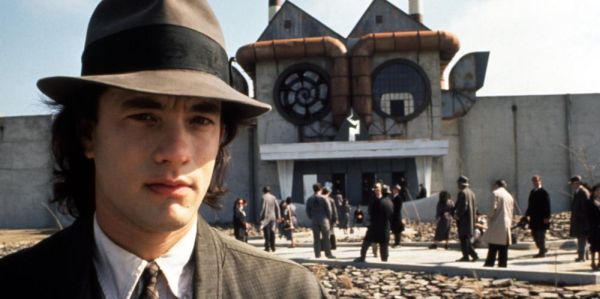
The factory where Joe works at the beginning of the film is Kafkaesque, portrayed in abysmal greys as a massive, fire spouting monster at the end of a crooked road walked by expressionless, dead inside employees. Eric Burdon’s heavily electric guitar version of Sixteen Tons plays as Joe and the others file into the mouth of the monster, “…another day older and deeper in debt. St Peter don’t you call me ‘cause I can’t go; I owe my soul to the company store.”
The factory is a meaningless place. It shows on Joe’s face, his long, pale, downcast face, upon which we viewers gaze, hoping to find some glimmer of the freedom that’s to come. Joe is submissive, unable to break out of the cycle he knows is killing him because he sees no alternative. For Joe being alive means participating in society as it has been designed. Joe has a job. Joe does his job. He is sad. He is in pain, but until he finds out he’s dying his sadness and pain are insufficient motivators.
We are Joe. This is our default state. We do what we think needs to get done, ever inching down a hole the purpose of which we’ve long forgotten, the light ever farther away. I have dreams like this. I am immersed in a terribly important social situation of one sort or another and as I strive to be useful in the way others want me to I find myself pressed into increasingly tight, dark, constricting spaces. Light recedes. This is an archetypal dream because it is a universal and pressing issue. It is the easiest thing for a human to hit autopilot and start digging. It takes real guts, and a real epiphany to prompt one to switch off autopilot, to back out of the hole, however deep, and start reaching upward.
A New Sense of Freedom: Peak Experience
The terminal diagnosis is the inciting incident. It offers a new sense of freedom that puts Joe in touch with his desires, draws out the dormant disillusionment, and discontent, providing the caution-to-the-wind sort of bravado that opens up an arena of truth, of confrontation, and of impassioned risk taking. What John Patrick Stanley is doing here is giving viewers access to the effect of epiphany without our ever having to actually come face to face with our own imminent deaths. This is the value of art: it provides narratives for learning without the necessity of actual experience.
Philosopher and occultist Colin Wilson has written over fifty books all pressing the same idea, an idea he considers integral to the fulfillment of human existence, something he calls “peak experience”. According to Colin Wilson, his first encounter with peak experience came after a long battle with despondence, a sense of meaninglessness, and a pressing desire to end his own life. Wilson held a gun to his mouth and as he felt the imminent possibility of death his consciousness thrust into a new, heightened state.
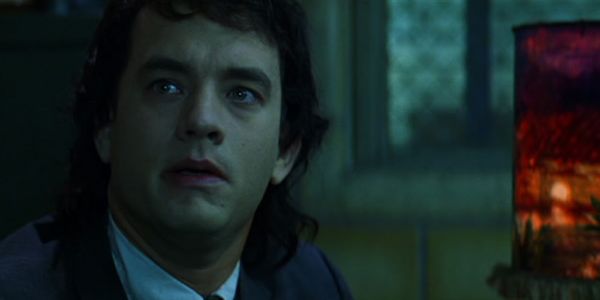
In this state the sensory experience of the world became luscious, the tenuous nature of existence came alive and pulsed, exciting and inducing a drunken sort of reverie. Wilson believes we are capable of attaining this state frequently if we apply ourselves, and that indeed we must apply ourselves to this end if we are to fully appreciate the brief span of our lives.
Dostoyevsky has written on this as well, having faced his own mortality after an execution order on his life was withdrawn. In “The Idiot” he writes of a man who, in the final moments before an execution (which is ultimately revoked) experiences more vividness, more depth and beauty than he had in a lifetime. Upon being granted a second go at life, Dostoyevsky, his character, and Colin Wilson, all resolved to strive always to attain and maintain this heightened state characterized primarily by attention and gratitude. This is at the core of Joe’s journey and its childlike illustration should have an effect on the viewer that is nothing short of life-altering.
While adrift in a raft in the middle of the ocean, starved and dehydrated, with no hope of rescue, Joe wakes up under the night sky in a state of delirium. The moon rises, a big fat Hollywood moon, which takes up half the ocean and seems birthed by the horizon. Joe stands at attention, lifts his hands as a worshipper, as though aiding the moon in its ascent.
“Thank you for my life,” he says, “I forgot how big. Thank you for my life.”
If you’re watching, if you’re really watching, this scene acts as a perfect “peak experience” generator. It swells the eyes and speeds the heart. The future is rendered irrelevant, as is the past. In the most desperate of circumstances, faced with nothing but his imminent death, Joe is overcome with revelry and gratitude. He embraces existence; he gets down on his knees and mourns the years he was too preoccupied with life to really thrive.
Transformation
Atypical of most Meg Ryan/Tom Hanks films, Joe Versus the Volcano uses the pair not as a platform for the blossoming of love, but for representation of growth and integration of the feminine and masculine selves.
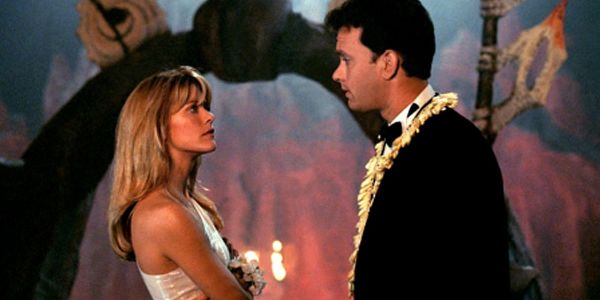
Meg Ryan plays three different characters, each characterizing a different stage in Joe’s development. She first inhabits a mousy colleague, closed off and afraid. Once Joe accepts his call to adventure, Meg Ryan takes on a new form, one of colour and character, a vivacious yet broken woman who reflects Joe’s fear as much as she does his growth. Third and finally, Meg Ryan inhabits a woman very much like herself in appearance, a natural blonde with a fierce independence and unabashed directness. This final transformation signifies the beginning of Joe’s integration, his move towards complete selfhood. Patricia is the character’s name. She is given one of the film’s most summarizing lines,
“My father says almost the whole world is asleep, everyone you know, everyone you talk to. He says only a few people are truly awake and they live in a state of constant and total amazement.”
Patricia desires, above all, to be “away from the things of man”. I read this as meaning Patricia is aware of the atrophying effect society has on the human spirit. She craves the uncertainty of the ocean and open sky, the reverie possible in solitary communion with the natural world. Total integration occurs when Patricia and Joe marry at the mouth of the volcano before jumping in. This union is symbolic of the Jungian notion of wholeness that comes from integrating the previously unintegrated selves (masculine and feminine) that we all contain and grapple with finding balance between the two opposing and often conflicted aspects.
Marriage here, as in fairy tales, does not represent the coming together of autonomous individuals but the re-unification of a single soul, which lifts one to a higher state of being, and thus grants the courage to leap into the unknown. Both characters have accepted uncertainty, both have denounced the autopilot ease and safety of life within a constricting society. As they leap, now wed, into the volcano, they represent our collective desire to excel beyond the confines of our fears and our need to appease, to function as cogs within a civilization that rewards us only with pacification.
Meg Ryan and Tom Hanks reincarnate as lovers in Sleepless in Seattle and You’ve Got Mail. They persist in Hollywood for decades gaining critical acclaim and accruing accolades but nothing else they’ve taken on ignites like one of their biggest flops. Joe Versus the Volcano must be revisited as a film for the “idiots” who desire a life brought to full richness by awareness of mortality, a life of integration, peak experience, and of “constant and total amazement”.
Guest Author
Robin Richardson

Robin Richardson is the author of two collections of poetry, and is Editor-in-Chief at Minola Review, a Journal of Women’s Arts & Letters. Her work is forthcoming in POETRY, and has appeared in many others including Tin House, Arc, The North American Review, and Hazlitt of Random House, and been interpreted for an opera entitled Earthquakes and Islands by composer Andrew Staniland for the Brooklyn Art Song Society in New York. She has been shortlisted for the Walrus Poetry Prize, CBC Poetry Award, Lemon Hound Poetry Prize, and ReLit Award and has won the John B. Santorini Award and the Joan T. Baldwin Award. She holds an MFA in Writing from Sarah Lawrence College and BA in Design from OCAD University. Richardson’s latest collection, Sit How You Want is forthcoming with Véhicule Press. Find her on Twitter.
Does content like this matter to you?
Become a Member and support film journalism. Unlock access to all of Film Inquiry`s great articles. Join a community of like-minded readers who are passionate about cinema - get access to our private members Network, give back to independent filmmakers, and more.
All articles contributed by people outside of our team are published through our editorial staff account.






